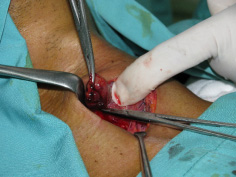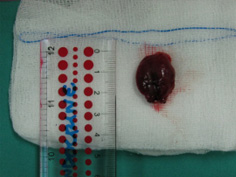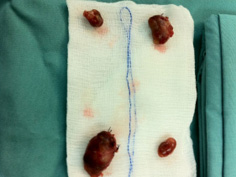A) Primary hyperparathyroidism
The parathyroid glands produces parathyroid hormone (PTH) which controls the level of calcium in the blood that affects your muscles, nerves, and bones. The condition hyperparathyroidism is caused when one of the parathyroid glands produces too much parathyroid hormone due to a tumour. The majority of hyperparathyroidism cases are primary hyperparathyroidism.
B) Secondary & Tertiary hyperparathyroidism
Sometimes the parathyroid glands are enlarged and produce too much parathyroid hormone because they are responding to a low calcium environment in the blood.
Low calcium stimulates the parathyroids to produce parathyroid hormone to try and increase blood calcium. The parathyroid hormone (PTH) causes bone to be reabsorbed to free up calcium. This situation can result in bone loss (osteopenia) and osteoporosis.. The overproduction of PTH is typically triggered by of one of three things:
- Low calcium blood levels (hypocalcemia)
- Vitamin D deficiency
- High blood phosphorus (hyperphosphatemia)
The most common cause of secondary hyperparathyroidism is kidney failure. Secondary hyperparathyroidism can be resolved by restoring kidney function. Tertiary hyperparathyroidism is the continued overproduction of PTH even after resolving the causes of the secondary hyperparathyroidism.
Parathyroid Surgery
Parathyroid surgery is highly successful (95%) for the majority of primary hyperparathyroidism cases. The surgery presents low risks to your health. Very occasionally there could be a vocal cord injury after surgery (1% or less). In 5 % of cases the surgery is not successful as the small tumour (adenoma) cannot be found, or if there is more than one adenoma. Occasionally a further operation is needed.



